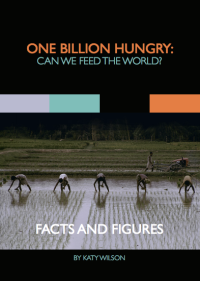 When discussing global food security, the issues of access and availability commonly come up. As One Billion Hungry examines, we currently produce enough food to feed the world, although demand is rapidly outpacing supply as populations and incomes rise and as the impacts of climate change escalate, and yet almost 900 million people do not get enough food to eat. Increasing food production, while critical, is unlikely to solve hunger and malnutrition alone. A new report by the Global Harvest Initiative highlights the importance of trade to food security, examining how our global trade systems can and must change to serve the whole of the population.
When discussing global food security, the issues of access and availability commonly come up. As One Billion Hungry examines, we currently produce enough food to feed the world, although demand is rapidly outpacing supply as populations and incomes rise and as the impacts of climate change escalate, and yet almost 900 million people do not get enough food to eat. Increasing food production, while critical, is unlikely to solve hunger and malnutrition alone. A new report by the Global Harvest Initiative highlights the importance of trade to food security, examining how our global trade systems can and must change to serve the whole of the population.
Coming at a particularly relevant time, following the success of the Bali trade talks and with negotiations for several bilateral trade agreements underway, the report, International Trade and Agriculture: Supporting Value Chains to Deliver Development and Food Security, was developed by GHI in collaboration with trade experts from the New Markets Lab, TransFarm Africa, and the International Food & Agricultural Trade Policy Council.
Given increasing globalisation, global trade and markets are becoming more important in the decisions of individual farmers. For farmers to invest in their farming enterprises, an end market must be available to them. This means that international trade decisions made in far off countries are having more of an impact on farmers on the ground. The report urges an holistic and integrated approach to trade with the aim of developing effective in-country enabling environments and efficient and fair value chains.
Specifically the report highlights the following actions needed:
- Consistent, transparent, and science-based frameworks for regulating food safety, along with reliable processes for administering sanitary and phytosanitary (SPS) rules, are critical to value chain development and increased agricultural trade;
- Legal and regulatory issues play a significant role at all stages in value chain development – including inputs, production, processing, transport, and end markets – and many of these issues are covered by trade rules and disciplines;
- Trade policy instruments can help foster the development of reliable systems for moving goods – including food, inputs, and equipment – and services through necessary legal and policy infrastructure and appropriate trade facilitation interventions;
- A stronger focus on services will be increasingly important to agricultural trade, with laws and regulations needed that can support open systems for transport and distribution services; financial services; and wholesale, retail, franchising, and other services;
- In places like sub-Saharan Africa where so many markets are small and landlocked, regional integration and harmonization of laws and regulations will be critical to agricultural growth, and particular focus should be placed on how laws and regulations are being implemented in practice;
- Adequate and equitable intellectual rights protection is becoming increasingly important as technology, information sharing, and communication play an even larger role in value chain development;
- With agricultural markets becoming more and more global, inward-looking policies – including forced localization – will need to be handled carefully so that they do not pose a threat to agricultural development and food security; and
- There is a widespread need for commercially-focused capacity building designed to facilitate market development and generate regulatory reform in the agricultural sector.
Undertaking these actions should be the responsibility of the World Trade Organisation and a variety of international trade partnerships. The report clearly shows the need for innovation in trade and for greater transparency, in part to help uncover the potential for trade to actually help develop markets. As GHI state “Trade can and should impact individuals positively, add value economy-wide, and deliver broader food security and development benefits.”
While the report highlights the potential of trade to open up opportunities for farmers there is little mention of the need to protect farmers from the impacts of liberalisation, particularly where markets are mostly informal. Aiding small-scale farmers to meet the requirements of global markets in cost-effective ways must surely go alongside the increasing reach of international trade?









